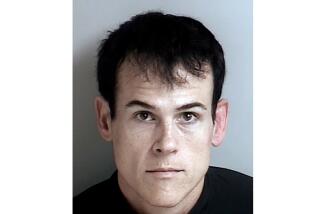Prosecutor Urges Continued Lockup for Rapist
- Share via
Calling Ronald Steven Herrera a “poster child” for the state’s sexual predator act, a Ventura County prosecutor told jurors Wednesday that the convicted rapist needs further psychological treatment and should be locked up at a mental institution for at least two more years.
“You will be convinced he represents a significant danger to the public if released,” Deputy Dist. Atty. Maeve Fox said in opening statements of Herrera’s commitment hearing.
The 53-year-old former Santa Paula resident, who raped a San Fernando Valley woman and her 15-year-old daughter in 1971, is fighting for his release from a state mental institution.
After serving most of his life behind bars for the two rapes and other violent crimes, Herrera was transferred to Atascadero State Hospital two years ago after being declared a sexual predator.
His two-year term of commitment has now expired, and prosecutors are asking a jury to send Herrera back to the hospital for further treatment.
“This case is somewhat unique because it doesn’t involve guilt or innocence, nor does it involve a question of liability,” Fox told the jury. “This case revolves around one question: Does Mr. Herrera fit the criteria of the state’s Sexually Violent Predator Act?”
Under the 1995 law, criminals with a history of sexual assault convictions and mental health disorders can be held against their will for treatment if a jury finds they are likely to attack again.
In chilling detail, Fox recounted for the jury Herrera’s criminal history and his pattern of violent behavior while in the state prison system.
In 1971, he was convicted of raping the woman and her daughter during a home-invasion robbery at a Ventura beach cottage. Authorities said Herrera and a second suspect held several other adults and children captive for more than five hours in that incident.
Fox told the jury that Herrera promised the mother before sexually assaulting her that he would not rape her daughter, then cornered the girl in a bathroom and raped her anyway. Afterward, he made the daughter write her name and telephone number in his address book.
Less than a week after his conviction in that case, Herrera and three other inmates at the old Oxnard jail escaped. Herrera fled to Virginia, where he was later convicted of several armed robberies and attempted murder. He served 13 years of a 50-year sentence before being released and returning to Ventura County.
In 1986, he was arrested in Ventura after a drunk driving accident. Authorities realized he had never served time for the prior rape conviction, and Herrera was sent to prison for eight years and eight months.
As an inmate at Folsom State Prison, Herrera attacked a cellmate with a bar of soap stuffed in a sock and was later transferred to the maximum security prison at Pelican Bay, Fox said.
At one point, prison authorities placed plexiglass on the outside of the bars of his cell because he repeatedly hurled feces at the guards, she said. Herrera also sent threatening letters to Ventura County judges during his stay.
In March 1996, Herrera was scheduled for release. But county officials ordered him held under the then three-month-old sexual predator law. He was the county’s first convicted felon sent to a mental institution under the controversial statute.
During the past two years at Atascadero, Herrera has refused treatment for a variety of disorders, Fox said. He has contacted women against their will by phone and mail from the hospital, including a Missouri woman he picked out of a personal ad in the newspaper.
Fox told the jury that Herrera suffers from mood swings and an anti-social personality disorder. He has threatened, spat at and verbally assaulted hospital officials, and his treatment chart--totaling more than 2,000 pages--is replete with such incidents, she said.
“You will be offended, you may be shocked. But you need to hear this information about him,” Fox said. “You are going to learn he is extremely mentally ill [and] poses a significant risk of danger to the community.”
Deputy Public Defender William Markov declined to give an opening statement.
Jill Nelson, a state psychologist who evaluated Herrera, was called as the first witness. Nelson told the jury that a criminal’s “past behavior is one of the strongest predictors of future behavior.”
Based on her sessions with Herrera, Nelson said she concluded he has no remorse for his crimes and blamed the victims for not halting the 1971 attacks.
“From his point of view, he didn’t do anything wrong,” Nelson testified.
Nelson told the jury that Herrera has refused medication and other treatment aimed at preventing criminal relapses, because he doesn’t think he has any mental problems.
More to Read
Sign up for Essential California
The most important California stories and recommendations in your inbox every morning.
You may occasionally receive promotional content from the Los Angeles Times.











